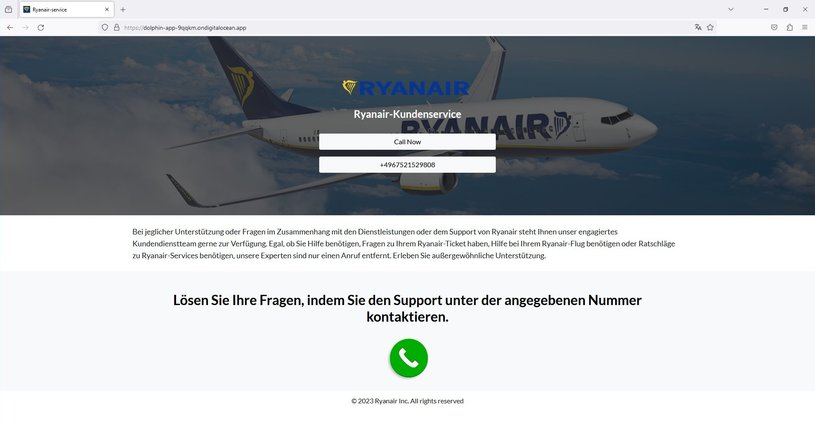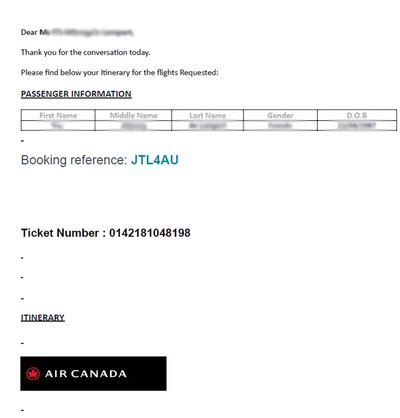Fake airline hotlines - beware of rip-offs!
When flight problems arise, passengers are often looking for quick contact with the airline's customer service or booking platform. Scammers are taking advantage of this, luring passengers into traps with fake websites and bogus phone numbers. If you are not careful, you could lose a lot of money.
When a flight is suddenly cancelled or luggage is lost, many people's first instinct is to contact the airline. If the contact details are not at hand, the next step is to look up the airline's phone number on the internet. In their haste, they may overlook the fact that they have not landed on the official website, but on a fake site with a fake hotline.
So far, ECC Germany is aware of cases where fraudsters have pretended to be employees of Ryan Air, Air Canada, Delta Airlines and Opodo, or to be acting on behalf of these companies.
It can be assumed that fraud attempts are also being made in the name of other airlines or online booking portals.
Fraudsters' typical approach
Anyone who dials a bogus service number is connected directly to a supposed customer service representative: "Welcome to ..., my name is ..., how can I help you? Scepticism is in order here. Typical hotlines usually have a welcome message and a menu through which you can reach a real advisor.
The supposed agents will then ask for your first name, surname and booking number.
With this information, the scammers can display detailed flight information on the real airline's website, such as Ryanair. If the customer wants to change their booking, for example, the criminals can give them alternative flights with exact times and connections.
They are then asked to give their credit card details for the rebooking fee. This is the last point where consumers should be vigilant. Never give out your bank details over the phone!
You will then receive an email with the exact flight details. This will include a link to confirm the booking (see example). Be careful: Even if the link is not clicked, the fraudsters can still use the credit card details you provide to charge your account.
Another scam is to persuade consumers to install remote maintenance software on their smartphone or computer, for example, under the guise of being able to help them with their booking. Installing such a tool not only gives criminals access to your personal information, it can also infect your device with malware.
Example: Fraudulent booking confirmation with payment request
The following email was sent to a consumer by a fake customer service agent, confirming a requested alternative flight from Europe to Canada and back. The booking reference and ticket number are fictitious. The inserted airline logo is intended to inspire confidence. There is also a screenshot of the booking request to the airline. The consumer confirmed the supposed booking. An amount was taken from her account. She never received a ticket.
Criminals are likely to be based outside the EU
The fraudsters pretend over the phone to work for either the airline, the relevant online booking portal or a third party company that deals specifically with travel enquiries. The name PCM Travels UK Ltd (the Travelmakers) is often used, as is Flycheapestonline Limited.
It is important to note that an airline would not use an external company to handle customer enquiries.
The actual location of the scammers appears to be outside Europe. For example, a location in India has already been identified through the localisation of IP addresses. In a consumer complaint to the ECC, an Indian accent of the alleged customer advisor was also noted.
Holiday periods particularly vulnerable to fraud
Fraudsters seem to exploit extreme situations to promote their fake websites, such as pilot strikes or baggage chaos at airports during the summer holidays.
This is because official hotlines are often manned at all times. Passengers look for other ways to contact them and end up on the fraudsters' fake websites.
And in stressful situations, travellers appear to be more willing to share sensitive information with the supposed customer service.
Social media channels can also be fake
In order to get help quickly and avoid long waits on the customer hotline, affected passengers also look for contact options on social media.
Fraudsters also take advantage of this and copy the social media presence of well-known airlines.
Signs of a fake account include a different name, for example if the airline name is followed by a number. Or if the account has been created recently and only has a few posts, or if it lacks a verification icon.
Tips to protect yourself from false customer advisors
- Before you travel, find out the airline's official telephone number from your travel documents. This way you will have the right number to call in case of an emergency.
- Do not trust websites/phone numbers suggested by Google. The scammers have probably sponsored their fake sites to appear before those of the real airlines and platforms.
- Check the website address. Fake websites have a strange domain, e.g. dolphin-app-9qqkm.ondigitalocean.app.
- Legitimate hotlines have a recorded message and are usually on hold. However, if you speak directly to a customer service representative, be sceptical.
- Be vigilant in hectic situations, such as at the airport. If you get a bad feeling on the phone, hang up.
- Never give out sensitive information such as your credit card number over the phone.
- Do not install any applications or tools (so-called remote maintenance software)
What should you do if you have been scammed?
- Contact your bank. In cases of fraud, it is often possible to initiate a chargeback.
- File a police report.
- Remove any installed remote control software from your device and make sure you have not received any malware.
- Report the scam to the relevant authorities so that others can be warned and fake sites can be removed. Click here for reporting forms from the German Federal Network Agency, Watchlist Internet and the German ECC.
- Take your concerns to the airline's genuine customer service department.
Funded by the European Union. Views and opinions expressed are however those of the author(s) only and do not necessarily reflect those of the European Union or the European Innovation Council and Small and Medium-sized Enterprises Executive Agency (EISMEA). Neither the European Union nor the granting authority can be held responsible for them.
You may also be interested in
- Your rights in the event of flight delays and cancellations
- Official airline contact forms
- Our Caution Trap section
- The Chargeback Process




![[Translate to English:] Betrügerische E-Mail 2 Screenshot-2: Betrügerische Buchungsbestätigung](/fileadmin/_processed_/d/3/csm_Betruegerische_E-Mail-2_5714cecec6.jpg)
